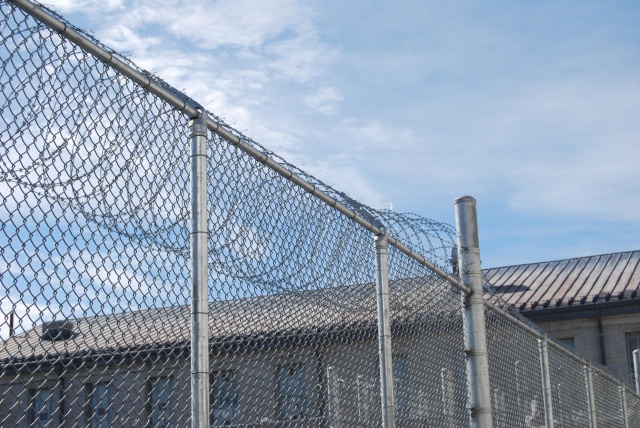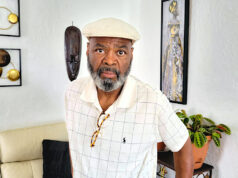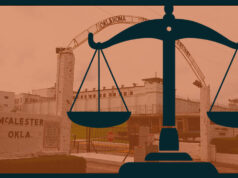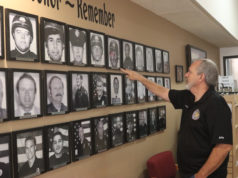
Oklahoma imprisons women at double the national rate. About 80 percent of them are locked up for nonviolent offenses. We don’t just incarcerate a higher percentage of women than any other state. We’re No. 1 in the entire world.
The time is right for Oklahoma and the rest of the nation to listen to the women we imprison. A great starting point is Poetic Justice: Poems by Women at David L. Moss Criminal Justice Center, which features the best poetry from 400 female inmates of the Tulsa County jail.
Compiled and edited by Ellen Stackable, Claire Collins, Hanna Al-Jibouri, Maggie Lane and Jenna Jones, the collection yields insight into the full diversity of the human experience. These dedicated Tulsa educators create a safe space where women can find their voice through poetry. The book sells for $5, and all proceeds go to the Poetic Justice program.
By honestly sharing their experiences, the women learn how to turn the class’ words of mutual affirmation into outstanding verse. The inmates reveal feelings about motherhood and sexuality as well as their painful scars and the disrespect that is dumped on them by the correctional system — and so much of the rest of society.
For example, Things I Learned at David L. Moss, by M.G., previews a world of complexity and contradictions:
The mental escapees, dykes, human traffickers, pregnant woman, barely legal girls, drug makers, drug dealers, women seeking recovery, women doing drugs, some selling drugs, escorts, thieves, hot dates, corrupt detention officers, false accusations, bitches hating, commissary hoes, commissary pimpin’ …
Temptations, stinking women, cornbread begging inmates, Sheriff, top flight security, taking their jobs to the maximum capabilities. Men who do strange things behind cell doors, calls tapped by laws, everything recorded.
Meanwhile, O.J. ventures into motherhood and sexuality in Dearest Olympia. She advises her daughter:
Make all your mistakes loudly. Drink more SoCo. Stay that extra week in London, kiss your girlfriend before they send her away. Take no one’s advice but your own. Keep listening to your mother. Bleach that Mohawk platinum. Go to the Police about rape …
Learn to curse quickly, to walk on your hands, to slow it down some.
Love,
An Incarcerated You
S.F., in Dear Lonely Princess, tells her daughter:
If you ever end up raped and bloody, the baby kicked out of your stomach; if you ever look in the mirror and see a black eye or two, or you look at the person you lay next to and hate them but are scared of being alone, LEAVE.
J.H.’s message to her child, Until We Meet Again, is just as blunt:
Until we meet again …
I will cherish every day you were growing inside of me
And the 19 hours of labor pain.
Until we meet again
I will never forget
The two hours they gave me to share with you.
Anyone would be scarred by the trauma these women have endured, but they battle their pain. M.G.Z. does so with wry humor in Scars. She writes:
So forgive me, my friend
If I get scared
But my emotions
Are temporarily
Under repair.
The determination to overcome their ordeals is also illustrated in L.B.’s What It’s Like to Be Scarred and Pretty:
It’s like looking in a mirror not knowing who you will see.
…
Each scar represents a self-made puzzle piece.
It’s like I don’t know who I am until I start to bleed.
…
It’s like shattering that mirror and craving the sharpest piece.
It’s like going through this life, not knowing how to feel.
It’s like going through this life, not knowing how to deal.
It’s like being scarred and pretty is the only way to heal.
Anonymous explains further in What’s It Like — Prison Life (For Those of You Who Don’t know). In doing so, she reminds us that it is not just the criminal justice system that ignores their humanity.
It’s waiting on a letter when you’re doing time.
Family won’t write or send you a dime
…
Friends and family who forget your face
It’s hearing them lie, saying they’ll try
…
It’s hearing their promises go straight to your head.
The poets’ irony also helps shield them from the indignities that the system dumps on inmates. Given the inhumanity of the prison’s responses to their suffering, as illustrated by Here in the Dungeon of My Life, it seems much more difficult to laugh at the impersonality and the loneliness of David L. Moss.
E.P. muses about, “The cold of orange floating around as if there is no such thing as another color.” The repeated ritual of the lockdown begins with, “One bully, two bully, three bully four.” And L.J.H.’s Lockdown concludes:
Doing time in jail
Being locked down on lockdown in lockdown is Hell.Lockdown done in two minutes
Welcome to jail.
The indignities of the cycle of society taking its pound of flesh from offenders is then encapsulated in S.P.’s Panties Someone Already Worn:
The butt-crack of dawn
I sleepwalk along
In panties
Someone else
Wore before me
Not surprisingly, the brutality of prison can wear down anyone. S.H. observes in The Place:
This place is cold and mechanical
And it’s hindering my ability to
Give a fuck.
On the other hand, as long as inmates retain a sense of humor, it can help them cope, as S.L.L. does in Bankrupt:
I’m poor in zoom zoomz and wam wamz
I’m poor in packets of Kool-Aid[but] I have a heart that’s full of love
Let’s just hope Oklahomans can find it in our hearts to stop this unnecessary cycle of rubbing salt in the wounds of women who have suffered so much. Reading Poetic Justice is a great first step. Then, perhaps we can expand education efforts like this wonderful program headed by Ellen Stackable at the Tulsa County jail.
The next step, of course, would be to repudiate this punitive mass institutionalization that amounts to cruel and unusual punishment, and create a corrections system — and a community — worthy of our shared humanity.
For more information or to purchase copies of Poetic Justice, follow this link and reach out to Ellen Stackable.
(Editor’s Note: This post was updated Jan. 3 to clarify who should be contacted about purchasing the book.)





















